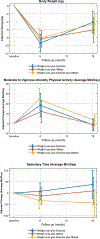Intervening on exercise and daylong movement for weight loss maintenance in older adults: A randomized, clinical trial
- PMID: 34932885
- PMCID: PMC8711609
- DOI: 10.1002/oby.23318
Intervening on exercise and daylong movement for weight loss maintenance in older adults: A randomized, clinical trial
Abstract
Objective: This study aimed to determine the impact of dietary weight loss (WL) plus aerobic exercise (EX) and a "move more, more often" approach to activity promotion (SitLess; SL) on WL and maintenance.
Methods: Low-active older adults (age 65-86 years) with obesity were randomized to WL+EX, WL+SL, or WL+EX+SL. Participants received a social-cognitive group-mediated behavioral WL program for 6 months, followed by a 12-month maintenance period. EX participants received guided walking exercise with the goal of walking 150 min/wk. SL attempted to achieve a step goal by moving frequently during the day. The primary outcome was body weight at 18 months, with secondary outcomes including weight regain from 6 to 18 months and objectively assessed physical activity and sedentary behavior at each time point.
Results: All groups demonstrated significant WL over 6 months (p < 0.001), with no group differences. Groups that received SL improved total activity time (p ≤ 0.05), and those who received EX improved moderate-to-vigorous activity time (p = 0.003). Over the 12-month follow-up period, those who received WL+EX demonstrated greater weight regain (5.2 kg; 95% CI: 3.5-6.9) relative to WL+SL (2.4 kg; 95% CI: 0.8-4.0).
Conclusions: Pairing dietary WL with a recommendation to accumulate physical activity contributed to similar WL and less weight regain compared with traditional aerobic exercise.
© 2021 The Obesity Society.
Conflict of interest statement
Figures


Comment in
-
Response to "The problems hiding in the self-report basis in a weight loss maintenance trial".Obesity (Silver Spring). 2022 Apr;30(4):798. doi: 10.1002/oby.23402. Epub 2022 Mar 4. Obesity (Silver Spring). 2022. PMID: 35244340 No abstract available.
-
The problems hiding in the self-report basis in a weight loss maintenance trial.Obesity (Silver Spring). 2022 Apr;30(4):797. doi: 10.1002/oby.23403. Epub 2022 Mar 4. Obesity (Silver Spring). 2022. PMID: 35244347 No abstract available.
References
-
- Houston DK, Nicklas BJ, Zizza CA. Weighty Concerns: The Growing Prevalence of Obesity among Older Adults. J Am Diet Assoc 2009. - PubMed
-
- 2018 Physical Activity Guidelines Advisory Committee. 2018 Physical Activity Guidelines Advisory Committee Scientific Report. 2018.
Publication types
MeSH terms
Grants and funding
LinkOut - more resources
Full Text Sources
Medical

